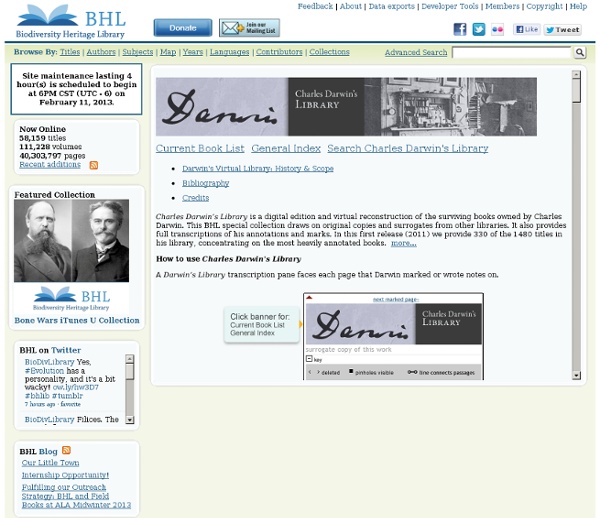Charles Darwin's Library

Elsevier Products
For a broad and diverse range of scientific disciplines, eBooks on ScienceDirect offer full-text book content, including titles published under the renowned Academic Press and Pergamon imprints. In one convenient platform, thousands of monographs and series books are fully integrated with journals, handbooks, major reference works and more. New White Paper: The Quality Connection: Academic users define the value of high quality eBooks to facilitate high quality teaching and learning outcomes Find books on ScienceDirect: Click here to browse books in all subject areas. eBooks are offered in collections or on a pick-and-choose basis. Major Reference Works Elsevier's reference titles on ScienceDirect are an authoritative source for building foundational knowledge in one's area of expertise and gaining interdisciplinary, comparative perspective in related or new areas. Elsevier's Major Reference Works feature individual reference works on key scientific subject areas. Reference Modules
NASA bids farewell to amazing relic, the shuttle
Origins
by Lucas Laursen Charles Darwin may have had his biggest impact on biology, but he began his scientific career as a geologist. So it’s appropriate that earlier this year, retired geologist John Ramsay, who had long studied the famed biologist’s life, accepted a commission to compose a Darwin-themed string quartet. Darwin “did some pretty fundamental geological mapping," says Ramsay, drawing a parallel to his own geological career, during which he has drawn maps of the Scottish Highlands, South Africa, and the Swiss Alps. At the beginning of the piece, a disorganized Earth takes shape, with the core, mantle, and crust emerging into distinct musical themes. Performed by the Fitzwilliam String Quartet, Ramsay’s composition premiered in Cambridge, U.K., during the Darwin Festival (Ramsay pictured above and Quartet playing pictured below) on 7 July 2009. When his tour was over, Ramsay had to decide between pursuing music or geology. And what would Darwin have thought of the composition?
The Beagle Project Blog: Pics in space
One of the most exciting science projects we plan to do aboard the new Beagle is to correlate ocean surface biological surveys with images of our position taken at the same time by our astronaut friends aboard the International Space Station. The premise of such a study got a big boost this week when Nature published special News Features and Commentaries on earth monitoring. The issue includes an essay by Stewart Brand of the Long Now Foundation. Way back in 1966 Brand promoted 'the idea of photographing the "whole Earth" from space, hoping that it would stimulate humanity's interest in its mega-habitat.' And oh, how it did. On Christmas Eve, they transmitted the first images of the whole Earth that anyone had ever seen. Stewart Brand was right in 1966, so let's listen carefully to him now. Throw in a charismatic tall ship with a scientific legacy like the Beagle's and we might find ourselves even closer to achieving Brand's vision.
Welcome | Newton Project
Ericae.net Online Education Recource.
European Science Parliament
International Darwin Day Foundation
Related:
Related:



